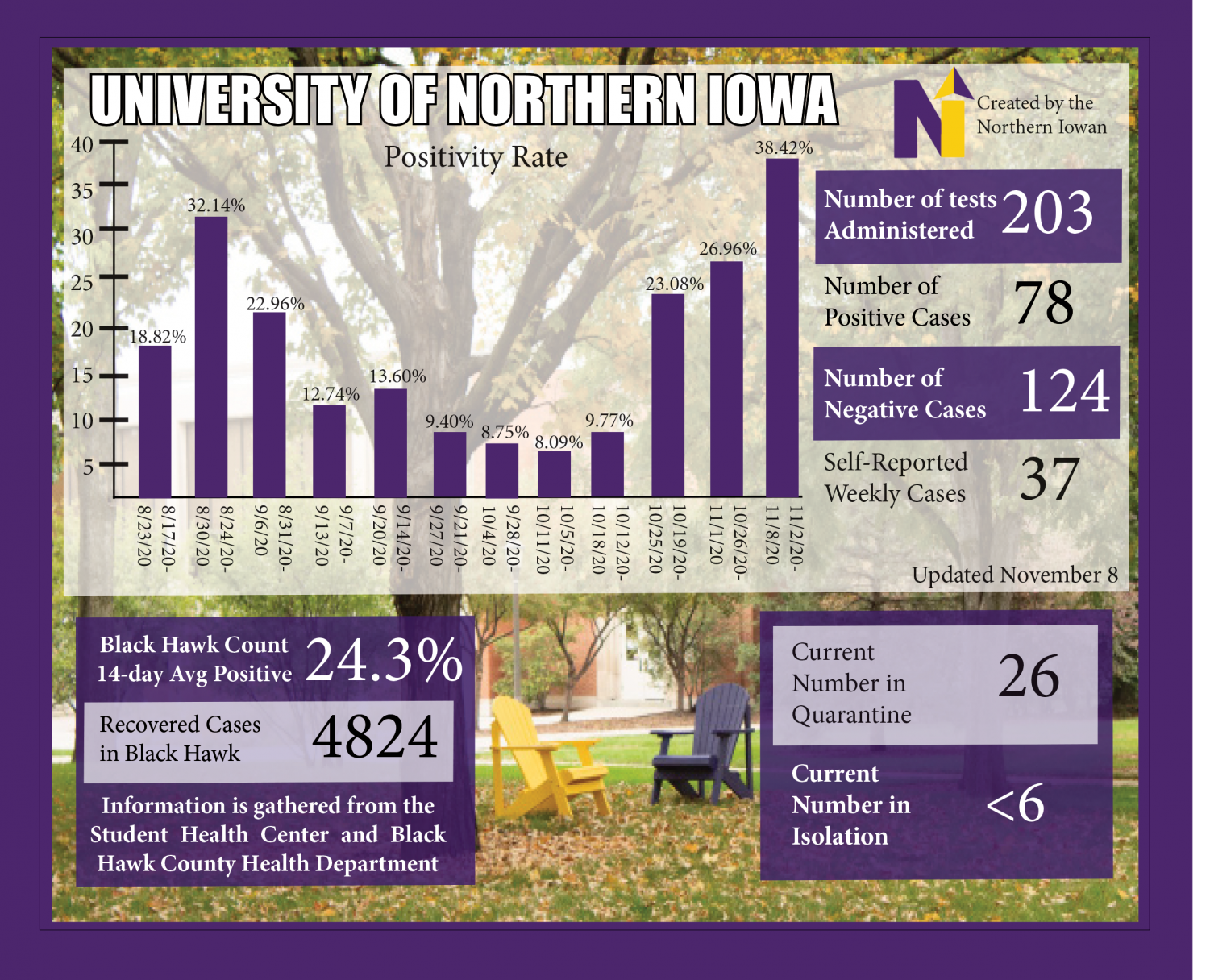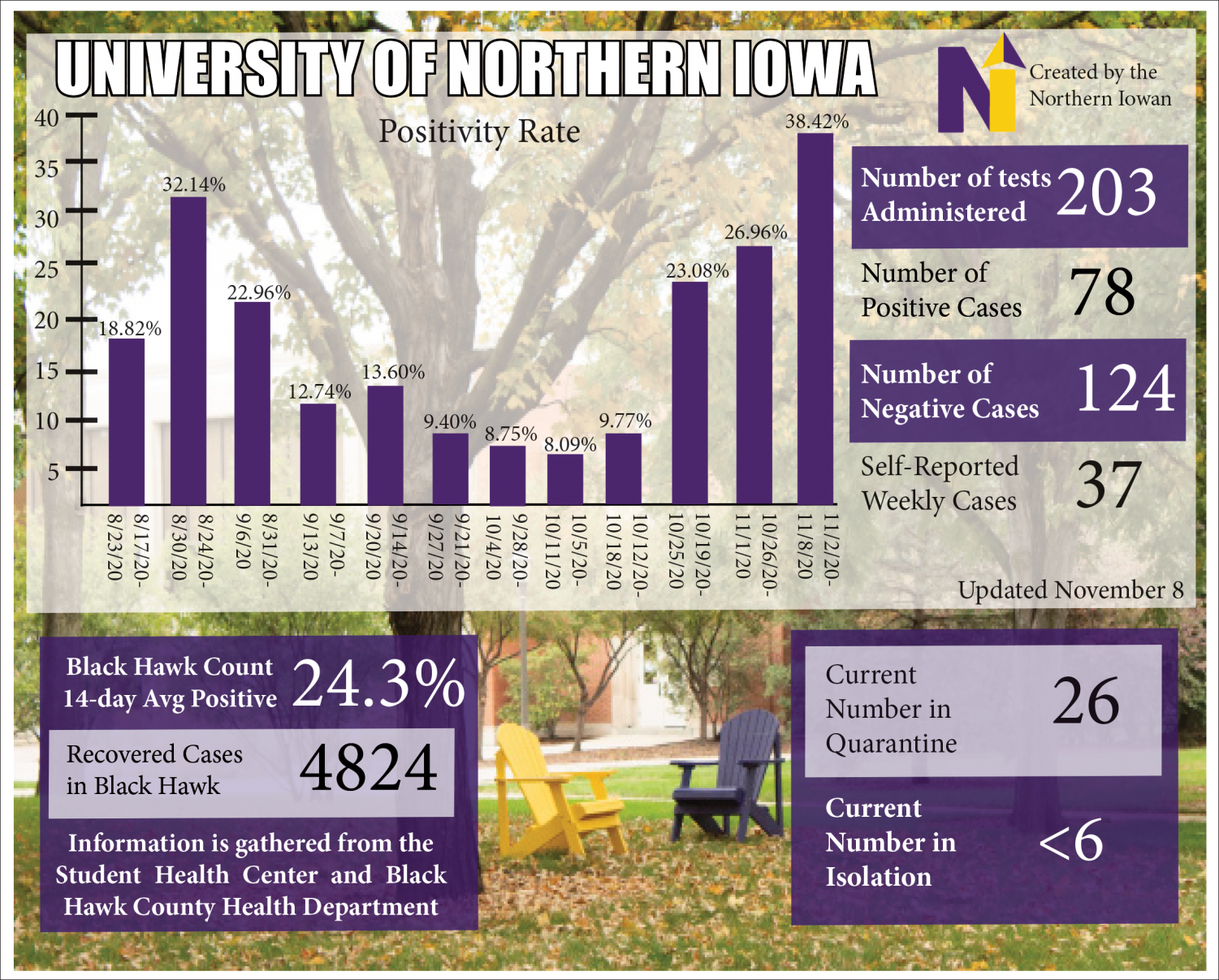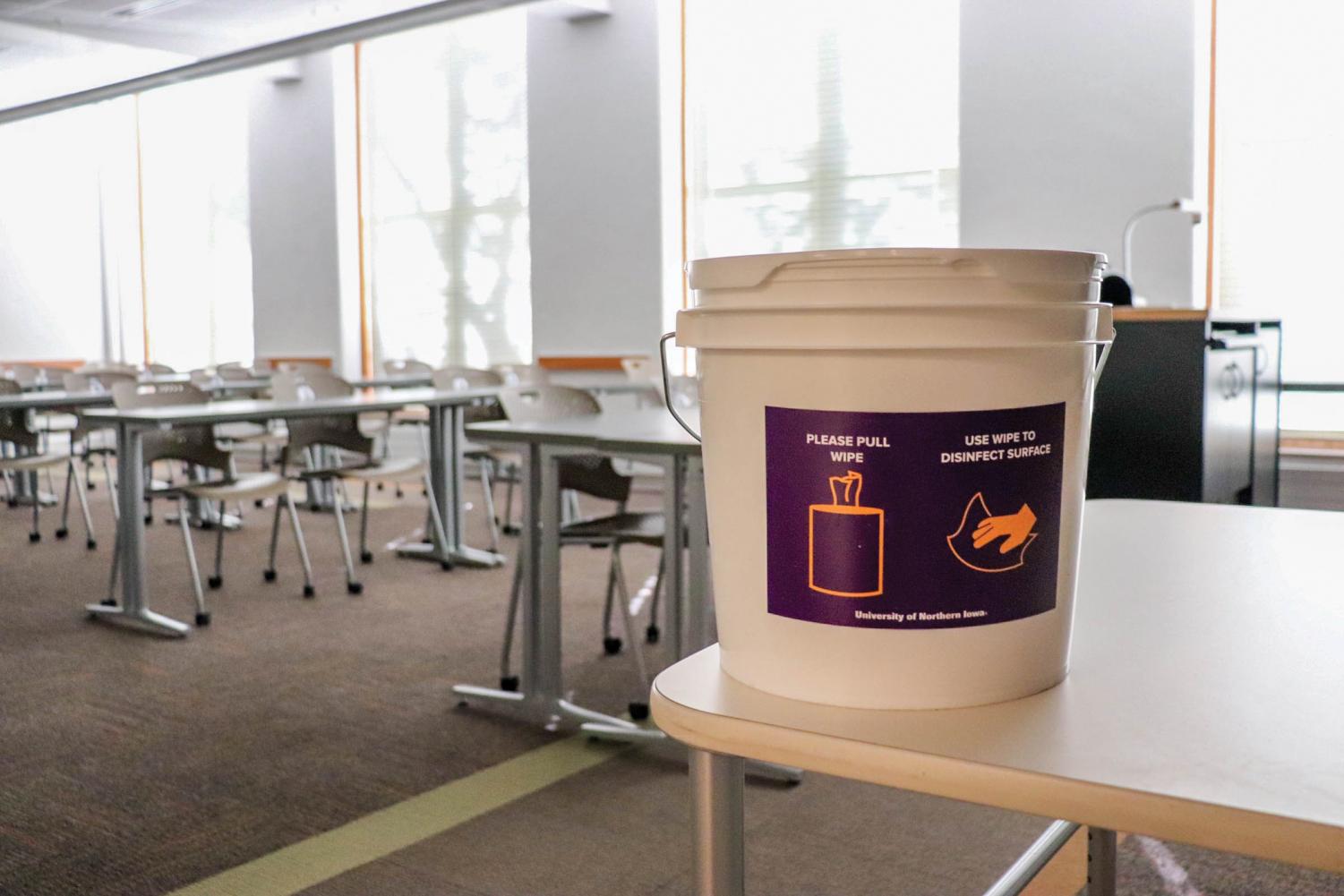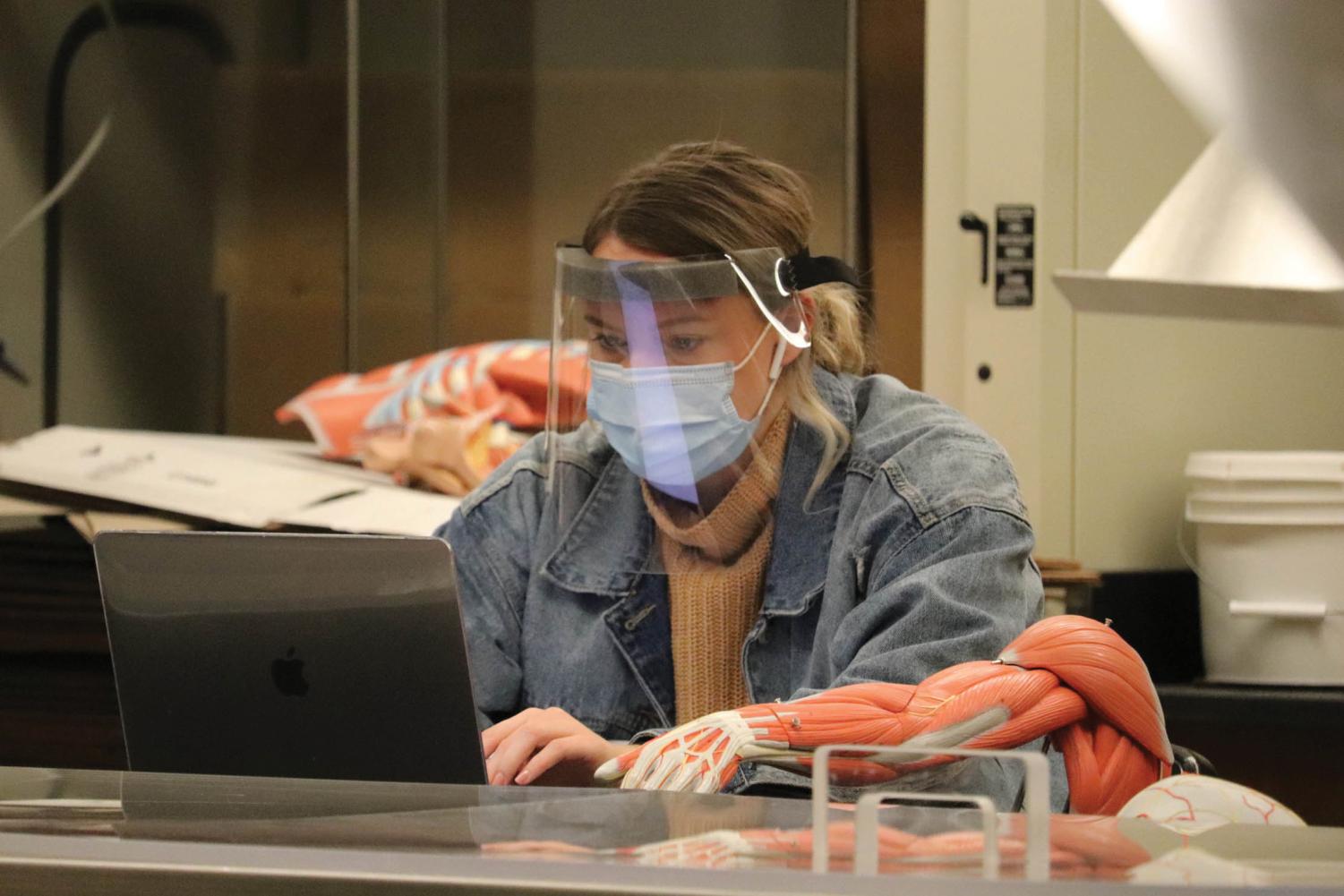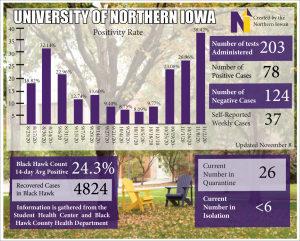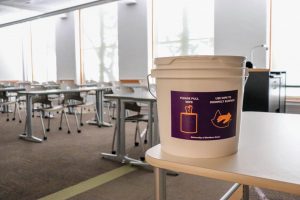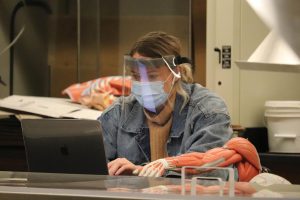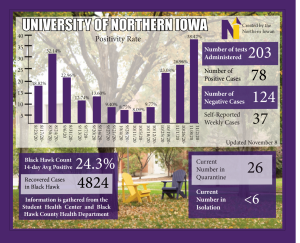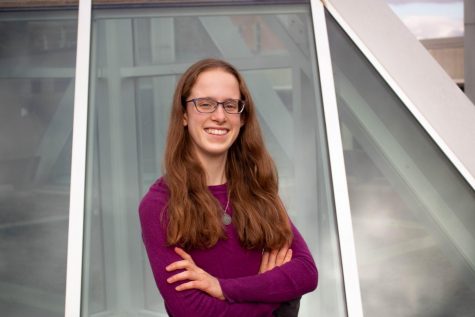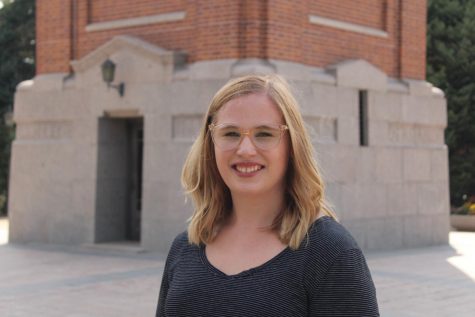COVID-19 on campus: numbers increase
Nov 9, 2020
New cases of COVID-19 on the UNI campus more than doubled in the last week, according to the latest data released by the UNI Student Health Center.
According to data released Friday, Nov. 6 at noon, the 203 tests conducted from Nov. 2-8 through the Student Health Center resulted in 78 positive cases, for a 38.42% campus
positivity rate.
The university also reported 37 self-reported cases of COVID-19 during the same period, including 16 student cases and 4 faculty/staff cases on Friday, Nov. 6 alone. However, these self-reported cases may also be counted in the Student Health Center weekly totals, and therefore, the numbers cannot be combined for a grand total.
Although the positivity rate may decrease slightly today when the Student Health Center updates last week’s data to include any tests conducted on Friday, these numbers still represent a substantial increase from the 32 new cases and 26.02% positivity rate reported by the Health Center last week. The spike comes after several weeks of rising case counts and positivity rates on campus.
“I was honestly really disappointed to see it jump from pretty low and manageable to feeling kind of out of control,” said Leah Evans, a junior communication studies major.
However, the university’s COVID-19 Response Team assured the campus community in an email that the increase is not linked to university activities such as in-person classes.
“Despite the rise in cases, our data indicate COVID-19 is not being spread on our campus,” they wrote. “Individuals are primarily coming into contact with the virus when in close proximity with affected friends or family members, or when attending social gatherings.”
As proof, the Response Team pointed to the campus infection rate, which reflects the rolling 14-day total of positive cases in an area divided by that area’s total population. UNI began tracking the infection rate this week, and, according to the university’s data on Nov. 1, UNI’s infection rate was at .52% compared to Black Hawk County’s rate of 1.04% and the State of Iowa’s rate of .78%.
“What we are seeing is that our campus community has an infection rate half of that of the county,” the Response Team wrote. “This reinforces that the controls we have put in place are working.”
As COVID-19 cases continue to rise, some Iowa campuses have shifted to virtual operations beginning today. St. Ambrose University moved classes online through Nov. 13 and cancelled face-to-face extracurricular activities, and Eastern Iowa Community Colleges moved most classes online for the rest of the semester, although classes with labs or other hands-on elements will continue to meet normally.
Although UNI has not released any statement at this time indicating a similar university-wide decision, Provost Jim Wohlpart told faculty in an email on Friday that they have the option to shift their classes online if desired.
“If you need to do something different in order to keep moving forward — move your class online, for instance — please do so after a conversation with your department head, who should notify your dean,” he wrote. “Let’s make sure that we finish the semester intact, as much as possible: mentally, physically, emotionally, spiritually.”
For the most part, however, UNI students seem to agree with the Response Team that transmission of COVID-19 is not happening on-campus or in university classrooms.
“I don’t think that the COVID cases are necessarily coming from the campus. I think they’re probably from people going out,” said Brittany Trecker, a junior family services major. “I would say in general most people are following the guidelines that I see. Everyone on campus is wearing masks.”
Evans agreed.
“I believe them when they say that most cases are probably caught from off-campus activities,” she said. “Personally, I’m not worried about catching it in a class, but I am worried about getting it from someone who doesn’t follow the regulations on the weekends or something.”
Freshman art education major Tatiana Schaapherder blamed the substantial increase on “everyone going out on Halloween weekend.”
“I’m not sure if sending (classes) fully online would make a huge difference. People are still going to go out, people are still going to do stuff,” she said. “I think UNI has handled it pretty well… The university can’t do this, but I think the bars should be closed again, because that worked really well.”
Schaapherder said that although she feels safe on campus, she does “feel a little unsafe when other people go out.”
“It scares me for when I’ll go back home, because it’s so close to Thanksgiving, and I’m spending Thanksgiving with all my extended family, my grandma and my great-aunts, so that kind of makes me a little nervous,” she said.
The Response Team encouraged the campus to remain vigilant as the semester concludes.
“It is extremely important that we don’t let up on following recommended safety measures — both on and off campus,” they wrote. “We must do everything we can to slow the spread — it is a vital responsibility we all share.”

